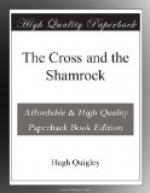“Oh, no, sir!” said Bridget; “we can’t leave this till our time is served out or our board paid,—two dollars a week for nearly three years. The priest, not long since, came here to see if he could get my brother and me off, but they told him they would not let us go. And besides that, they insulted his reverence by telling him, if he dared to come to try to kidnap us, they would tar and feather, or shoot him, the Lord save us.”
“I wish to God I was present,” said Murty; “I would settle bread on some of them; that I would, and no mistake,” said he, bringing his clenched fist down on the table, “if I heard them insult the minister of Christ in any shape or form. Oh, America! America!” said he, in an undervoice, “I am deceived in you. I thought you were a second paradise, where all was peace, and comfort, and justice, and prosperity, and true liberty. But alas! I find all my ideas of your character erroneous and false. All the crimes of the old world are not only here, where we thought the very soil was virgin pure and unstained, but here in the most odious forms. The poor at home were naked, and hungry, and ground; but most of them were innocent, and an innocent man is not entirely miserable. The poor here, besides their poverty and wretched slavery, working eighteen out of the twenty-four hours, are almost all wicked in addition. The crimes in the old country, that aristocratic institutions kept up in the inaccessible palaces of the rich,—like the panther’s den on the summit of yonder mountain,—here are familiar to the lowest and vulgarest of the populace. In the old country, the few and the rich were unjust, cruel, wicked; it was so in Ireland. Here the vices of the few are ingrafted on the many, and, like the small-pox, they do not become weaker, but stronger, by universal propagation. I wish I never saw you, America,” said he, musing, his head resting against the wall; “I wish I was in the grave with my two sisters and mother, rather than here to witness the slavery, corruption, and vice of America.” The remainder of his musings were lost in the sighs and emotions that proceeded from his manly bosom.
CHAPTER XIV.
THE FRUITS OF THE CROSS.
Paul was now a free man, the term of apprenticeship having expired. It was his right now, according to the terms of the implied contract, not only to receive support and clothing, but wages; and Mr. Prying was very willing to keep him in the house and give him a man’s wages; but this conflicted with Amanda’s plan and that of her advisers; consequently, Paul was reluctantly obliged to part with the society of his sister Bridget, who had yet a part of her term to serve, and to look out among the neighboring farmers for a situation. This he soon found in a gentleman’s family named Clarke, who was very glad to receive such a modest and intelligent young man into his family. This Mr. Clarke was not a farmer by profession, but




